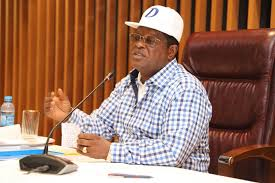Business
China’s foreign trade growth sees stable recovery in January-July period

By Du Haitao, People’s Daily
China’s foreign trade maintained double-digit growth in the first seven months of this year, despite the unfavorable external situation, intermittent COVID-19 impacts and other negative factors.
The country’s foreign trade volume reached 23.6 trillion yuan ($3.49 trillion) between January and July, increasing 10.4 percent year-on-year, according to statistics released by the General Administration of Customs (GAC).
In particular, exports grew 14.7 percent year-on-year to 13.37 trillion yuan, and imports reached 10.23 trillion yuan, up 5.3 percent. The country’s trade surplus expanded 62.1 percent to 3.14 trillion yuan during the same period.
The ASEAN, the EU, the U.S. and South Korea maintained the four largest trading partners of China in the January-July period. Their trade volume with China stood at 3.53 trillion yuan, 3.23 trillion yuan, 2.93 trillion yuan and 1.39 trillion yuan, up13.2 percent, 8.9 percent, 11.8 percent and 8.9 percent, respectively.
China’s trade volume with Belt and Road countries expanded 19.8 percent year on year, and that with the 14 Regional Comprehensive Economic Partnership (RCEP) economies was up by 7.5 percent in the first seven months of this year.
In the first half of this year, Shanghai’s foreign trade had withstood the test of the Pandemic. With the acceleration of the resumption of work and production, Shanghai’s local economy has returned to normal, strongly boosting the city’simports and exports.
In June, Shanghai’s foreign trade growth turned positive, standing at 9.6 percent, up 46.2 percentage points from that in April.
“Both the numbers of incoming containers and enterprises’ pickups have significantly increased. We are currently working at full capacity,” said customs officer Wei Jianhua from Shanghai’s Wusong district. Wei told People’s Daily that the Wusong customs handled 37,000 batches of goods in June, up 46.3 percent from a year ago and 370 percent from a month ago.
Statistics indicate that Shanghai municipality, as well as Jiangsu, Zhejiang and Anhui provinces, all of which are located in the Yangtze River delta, reported combined foreign trade growth of 11.7 percent in the January-July period, up 2.5 percentage points from that in the first half of this year. The figure was 25.7 percent in July alone, contributing over half to the national foreign trade growth.
According to statistics, China’s trade with RCEP partners reached 1.17 trillion yuan in July, up 18.8 percent year on year,boosting China’s overall foreign trade growth by 5.6 percentage points.
“The policy dividends released by the RCEP have helped us expand the overseas market. We’ll learn more about the requirements on imports from China set by Thailand, Singapore, Vietnam and other RCEP members, so as to introduce our products to these countries,” said Zhang Hao, who heads a high-tech company in south China’s Inner Mongolia autonomous region.
Recently, a batch of sea-buckthorn drinks weighing 115 tons and worth 1.62 million yuan produced by Zhang’s company received a certificate of origin under the RCEP. These products will enjoy a tariff cut of over 30,000 yuan when exported to Japan.
The company has exported 2,556 tons of sea-buckthorn drinks and capsules this year, with a total value of 35.16 million yuan.
“The tariff for our formic acid exports to Japan has been reduced to zero from 4.3 percent, while that for hexafluoropropylene from 3.1 percent to 0.3 percent,” said Zhang Guoqing, director of the sales division of Luxi Chemical Corp, a chemicals company based in east China’s Shandong province.
According to him, the tariff cut has significantly improved the company’s competitiveness in Japan, and the company’s exports to Japan surged 30 percent year on year in the first half of this year.
From January to June, certificates of origin were issued to 59,000 batch of exports with a total value of 18.39 billion yuan by Shangdong customs, as well as the province’s council for the promotion of international trade.
Experts from the GAC noted that China’s foreign trade is still facing instabilities and uncertainties, and to maintain steady growth of the sector remains a challenging task. However, China’s foreign trade has showed strong resilience in the first seven months of this year, laying a solid foundation for the whole-year performance.
As the country implements a series of measures to stabilize economy, further smoothens foreign trade logistics and facilitates work resumption, China’s foreign trade will be likely to keep maintaining stable growth.
Business
Senate Committee Commends Tinubu on Launch of National Halal Economy Strategy to Tap $7.7trn Global Market*

The Senate Committee on Finance has commended President Bola Ahmed Tinubu for launching Nigeria’s National Halal Economy Strategy, describing it as a bold and strategic move to position the country within the lucrative global halal market, estimated at $7.7 trillion.
In a statement signed by its Chairman, the committee praised the initiative as timely and aligned with international best practices. Several countries—including the United Kingdom, Canada, Australia, Malaysia, Indonesia, Saudi Arabia, the United Arab Emirates, Turkey, Brazil, Thailand, and Singapore—have successfully used halal frameworks to boost manufacturing, agricultural exports, financial markets, and foreign investment.
The committee highlighted Nigeria’s strong advantages for success in this space, including its vast agricultural resources, large domestic market, youthful population, growing manufacturing sector, and expanding services industry.
It noted that the strategy fits seamlessly into the Tinubu administration’s broader economic reforms, such as boosting non-oil revenue, diversifying exports, creating jobs, supporting small and medium enterprises (SMEs), and increasing foreign exchange earnings.
President Tinubu, represented by Vice President Kashim Shettima, officially unveiled the strategy on Thursday, February 6, 2026, at the Presidential Villa in Abuja.
The framework, developed in collaboration with Saudi Arabia’s Halal Products Development Company (HPDC) following a bilateral agreement signed in February 2025 at the Makkah Halal Forum, aims to enhance quality standards, certification processes, and competitiveness across sectors like food, pharmaceuticals, cosmetics, tourism, and ethical finance.
The committee described the strategy as inclusive, market-driven, and globally oriented, while fully respecting Nigeria’s diverse and pluralistic society.
It is projected to contribute significantly to the economy, with estimates suggesting it could add around $1.5 billion to Nigeria’s GDP by 2027 and unlock billions more in domestic value over the coming decade through expanded exports and investment.
The Senate Committee on Finance pledged its full legislative support, oversight, and cooperation to ensure smooth implementation, regulatory clarity, and long-term fiscal sustainability in the national interest.
“This decisive step reinforces Nigeria’s readiness to adopt proven international models, unlock new economic frontiers, and establish itself as a competitive player in the evolving global economy,” the statement concluded.
Business
Ex-Naval Chief Named in ₦100m Property Transaction Dispute
A property transaction dispute has emerged involving Zoe New Dawn Nigeria Limited and a former Chief of Naval Staff, following claims by the company’s chairman, Engr. Dr. Stephen Achema Akpa, that a ₦100 million payment made for land was not followed by a transfer of ownership.

According to Akpa, the payment was made in connection with a land transaction reportedly facilitated by the former naval chief. He alleged that despite documented payments, the land in question was neither transferred to the company nor was the money refunded.
Akpa said Zoe New Dawn Nigeria Limited possesses transaction records and related documents which, he claims, support its position in the dispute. He added that the company has initiated steps to seek redress through appropriate legal channels.
The matter has drawn attention due to the profile of the parties involved, particularly against the backdrop of recurring disputes linked to land ownership and property transactions in Nigeria’s real estate sector.
Industry observers note that unresolved land transactions remain a common source of litigation, often arising from disagreements over title documentation, intermediaries, and contractual obligations.
Zoe New Dawn Nigeria Limited stated that it intends to pursue the matter through lawful means to determine liability and recover any funds deemed outstanding.
As of press time, no official response had been issued by the former Chief of Naval Staff regarding the allegations. The dispute has not yet been confirmed as the subject of any court proceedings.
Business
Umahi Inspects Lekki Corridor’s 7th Axial Road Project, Expresses Confidence in CHEC

Minister of Works Senator Dave Umahi over the weekend inspected the progress of the 7th Axial Road project in the Lekki Corridor of Lagos.
The project, located behind the Dangote Refinery, is a crucial cargo handling route for the Lekki Deepwater Port and connects the Lekki Corridor with the Sagamu route.
The Minister expressed confidence in China Harbour Engineering Company Limited (CHEC), the project’s contractor, citing its successful delivery of the Lekki Deepwater Port and high-quality progress on the Makurdi-Enugu road reconstruction and expansion project. Umahi instructed that the roadbed filling work for Project LOT1 be completed by the end of April and directed the project team to accelerate resource input and tangible works to meet the deadline.
The 7th Axial Highway is expected to synergize with key infrastructure projects like the Coastal Road, Dangote Road, and Lekki Port, creating a comprehensive transportation hub model and boosting Nigeria’s port economy and industrial corridor. Umahi emphasized the need for environmental protection agencies to ensure efficient construction and steady progress while maintaining ecological safety.
A representative of CHEC who spoke during the inspection stated that the company would maintain a high level of resource input, implement the Minister’s directives, and coordinate safety, quality, and environmental protection to ensure the project’s timely and high-quality completion in other to unluck its port relief and regional economic benefits.
-

 Uncategorized5 years ago
Uncategorized5 years agoFG, states urged to harness flooding for ranching, others with technology – Agbaje
-

 Headlines10 years ago
Headlines10 years agoBreaking: EFCC seals Borno House of Assembly, as Hon members take to their heels
-

 News12 years ago
News12 years agoNigeria Security Operatives Stage Manhunt For Homosexual Perpetrator
-

 News9 years ago
News9 years agoHow 21-year-old Girl fled community over accusation of lesbianism
-

 News10 years ago
News10 years agoYobe Gov Moves Against Deputy
-

 Opinion7 years ago
Opinion7 years ago7 signs she has friend zoned you
-
Technology4 years ago
Online job placement company headhunts women
-

 Headlines10 years ago
Headlines10 years agoBorno Dep Gov Abducts Another Church Leader





